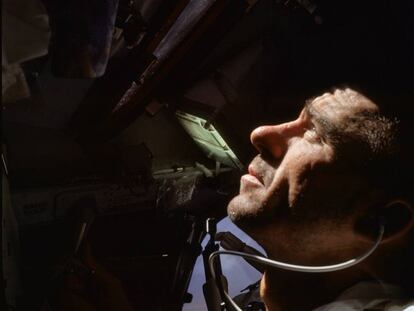Walter Cunningham, last survivor of the Apollo mission that paved way for Moon landing, dies at 90
The astronaut was an outspoken character who did not fit with the typical NASA profile

“What a lucky son of a bitch.” These were the first words out of Walter Cunningham’s mouth on May 7, 1961. He had just heard on the radio the roar of the rocket that carried the first American astronaut, Alan Shepard, into space. That young physics student was still unaware that just seven years later he would be on board Apollo 7, the mission that paved the way for the first human landing on the Moon. Cunningham, the last survivor of the three crew members of that historic mission, died on Tuesday at the age of 90, according to NASA.
In January 1967, Cunningham heard the terrifying screams of his three comrades as they were burned alive on Apollo 1 after a fire broke out in the cabin. Cunningham, along with Walter Schirra and Donn Eisele, was meant to crew Apollo 2. But the mission was cancelled while NASA worked on improving the safety of its spacecraft. The three astronauts were selected for a new mission: Apollo 7. It would be the first of the program to go into space, where it would complete 163 orbits of the Earth before returning. In his memoir, The All-American Boys, Cunningham wrote: “Flying is a death-oriented business. You either accept the odds or you stay the hell out.”
Cunningham was born into a humble family in the state of Iowa. Before his 20th birthday, he enlisted in the Navy, became a pilot and served on night combat flights during the Korean War in 1953. He will go down in history as an unusual astronaut: when he was selected by NASA in 1963, he was no longer active in the military, but he did have a master’s degree in physics. Unlike other astronauts, he was also not religious.
Apollo 7 was launched on October 11, 1968. Its three crew members spent 11 days in space, a record for a test mission. For the first time, images of astronauts floating weightlessly and doing interviews and jokes for viewers were televised. The mission was a technical success. The next mission, Apollo 8, was the first to orbit the Moon. And, after two more training missions, Apollo 11 astronauts Neil Armstrong and Buzz Aldrin landed on the lunar surface on July 20, 1969.
After returning to Earth, Cunningham remained an outspoken character. In 1972, a reporter from The New York Times asked him if he had found God in space. He answered: “I am a physicist, and everything I encountered in the flight can be explained [by the laws of physics]. It did not change my view of religion, earth, life. It had no revelations.”

After his space voyage, the physicist led the Skylab program to build the first US space station. He left NASA in 1971 and later went into real estate and other occupations. In more recent times, he sparked controversy by denying that human activity is driving climate change.
In his last years, the astronaut argued that space exploration should pursue new goals, and expressed regret that it no longer played a leading role in society. “We reached the Moon because we were not afraid of the unknown and because we wanted to take risks,” Cunningham said in 2019, during a Madrid event to commemorate the 50th anniversary of the Moon landing, organized by EL PAÍS and Openmind. “Only three generations passed between the first manned airplane flight [1903] and the first time a human went into space and orbited the Earth [Yuri Gagarin in 1961]. However, two generations have passed for whom the milestones of space exploration are just things they read about in the history books,” he said.
Cunningham was the last living crew member of Apollo 7 after the death of Eisele and Schirra in 1987 and 2007, respectively.
Sign up for our weekly newsletter to get more English-language news coverage from EL PAÍS USA Edition
Tu suscripción se está usando en otro dispositivo
¿Quieres añadir otro usuario a tu suscripción?
Si continúas leyendo en este dispositivo, no se podrá leer en el otro.
FlechaTu suscripción se está usando en otro dispositivo y solo puedes acceder a EL PAÍS desde un dispositivo a la vez.
Si quieres compartir tu cuenta, cambia tu suscripción a la modalidad Premium, así podrás añadir otro usuario. Cada uno accederá con su propia cuenta de email, lo que os permitirá personalizar vuestra experiencia en EL PAÍS.
¿Tienes una suscripción de empresa? Accede aquí para contratar más cuentas.
En el caso de no saber quién está usando tu cuenta, te recomendamos cambiar tu contraseña aquí.
Si decides continuar compartiendo tu cuenta, este mensaje se mostrará en tu dispositivo y en el de la otra persona que está usando tu cuenta de forma indefinida, afectando a tu experiencia de lectura. Puedes consultar aquí los términos y condiciones de la suscripción digital.









































